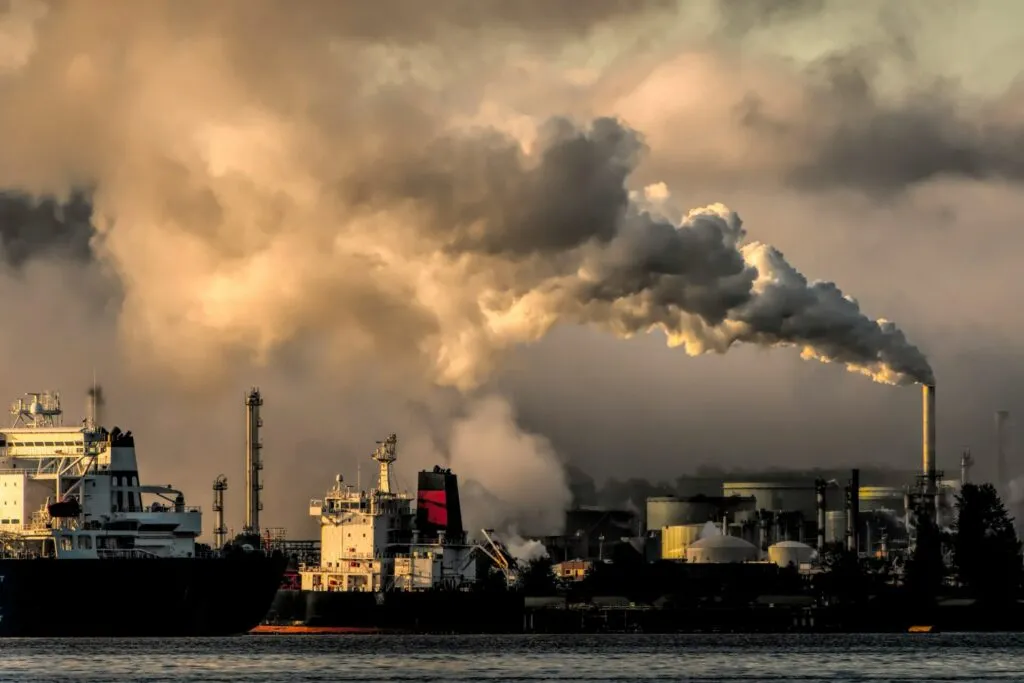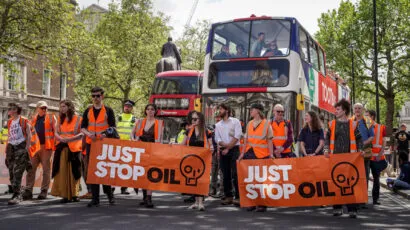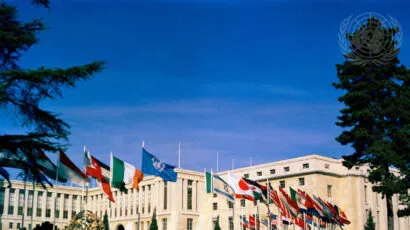World set to quadruple oil and gas production by 2030, led by new US projects
By Oliver Milman | April 4, 2024
 Last year, at least 20 oil and gas fields were readied and approved for extraction following discovery, sanctioning the removal of 8 billion barrels of oil equivalent.
Photo by Chris LeBoutillier on Unsplash
Last year, at least 20 oil and gas fields were readied and approved for extraction following discovery, sanctioning the removal of 8 billion barrels of oil equivalent.
Photo by Chris LeBoutillier on Unsplash
Editor’s note: This story was originally published The Guardian. It appears here as part of the Climate Desk collaboration.
The world’s fossil-fuel producers are on track to nearly quadruple the amount of extracted oil and gas from newly approved projects by the end of this decade, with the US leading the way in a surge of activity that threatens to blow apart agreed climate goals, a new report has found.
There can be no new oil and gas infrastructure if the planet is to avoid careering past 1.5C (2.7F) of global heating, above pre-industrial times, the International Energy Agency (IEA) has previously stated. Breaching this warming threshold, agreed to by governments in the Paris climate agreement, will see ever worsening effects such as heatwaves, floods, drought and more, scientists have warned.
But since the IEA’s declaration in 2021, countries and major fossil fuel companies have forged ahead with a glut of new oil and gas activity. At least 20bn barrels of oil equivalent of new oil and gas has been discovered for future drilling since this point, according to the new report by Global Energy Monitor, a San Francisco-based NGO.
Last year, at least 20 oil and gas fields were readied and approved for extraction following discovery, sanctioning the removal of 8bn barrels of oil equivalent. By the end of this decade, the report found, the fossil-fuel industry aims to sanction nearly four times this amount – 31bn barrels of oil equivalent – across 64 additional new oil and gas fields.
The US, which has produced more crude oil than any country has ever done in history for the past six years in a row, led the way in new oil and gas projects in 2022 and 2023, the report found. Guyana was second, with countries in the Americas accounting for 40% of all new oil sanctioned in the past two years.
The failure to even slightly slow down the hunt for new oil and gas risks a fatal blow to already slender hopes of the world remaining below 1.5C, a limit that scientists expect will be surpassed within a decade.
It comes as major oil and gas companies miss or water down their own targets to cut planet-heating emissions. At a recent industry conference in Texas, the boss of Saudi Aramco, the world’s largest oil company, said people “should abandon the fantasy” of phasing out oil and gas.
“Despite the constant and clear warnings that no new oil and gas fields are compatible with 1.5C, the industry continues to discover and sanction new projects,” said Scott Zimmerman, project manager of the global oil and gas extraction tracker at Global Energy Monitor. “It’s disappointing. It shows a lack of supply-side commitment to climate goals.”
Already operating oil and gas infrastructure will be enough to push the world beyond 1.5C and the extra activity planned will only further raise the global temperature. A total of 45 projects have been fully sanctioned, with 16 billion barrels of oil equivalent, since the 2021 IEA report, according to the new report, which is almost certainly an undercount of coming emissions as it doesn’t include “unconventional” extraction, such as fracking.
While the US has maintained its heavyweight status in oil and gas with the new discoveries, fresh areas of the globe are now being focused on by fossil fuel producers for new production, with South America and Africa becoming hotspots for upcoming projects.
Of the 22 countries with significant oil and gas discoveries in the past two years, four – Cyprus, Guyana, Namibia and Zimbabwe – accounted for more than a third of discoveries, despite having produced little or no oil and gas until recently.
The Shahini gas field in Iran – reportedly containing 623bn cubic meters of gas – is the largest single discovery of the past two years, followed by TotalEnergies’ Venus project in Namibia. The Kodiak project in Alaska, overseen by Pantheon Resources, is the third largest new potential oil and gas field.
“Oil and gas producers have given all kinds of reasons for continuing to discover and develop new fields, but none of these hold water,” said Zimmerman. “The science is clear: no new oil and gas fields, or the planet gets pushed past what it can handle.”

Together, we make the world safer.
The Bulletin elevates expert voices above the noise. But as an independent nonprofit organization, our operations depend on the support of readers like you. Help us continue to deliver quality journalism that holds leaders accountable. Your support of our work at any level is important. In return, we promise our coverage will be understandable, influential, vigilant, solution-oriented, and fair-minded. Together we can make a difference.
Keywords: Paris climate agreement, climate crisis, fossil fuels, oil and gas industry
Topics: Climate Change














